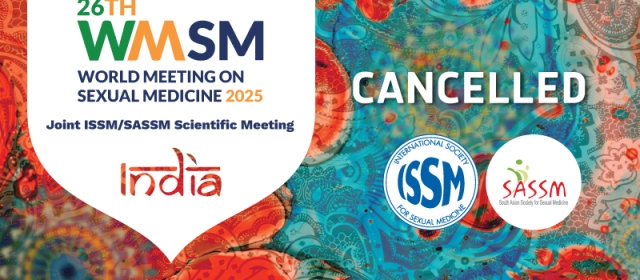
All News
Upcoming Events

Receptive anal intercourse (RAI) includes any sexual activity in which one partner inserts their body part (finger, penis, tongue) or object (sexual aids) into their partner’s anus and is more common than many may think. Approximately 36% of heterosexual women and 44% of heterosexual men have reported engaging in anal sex with a partner in their lifetime, and even more bisexual, lesbian, and gay men and women.

Postural Orthostatic Tachycardia Syndrome (POTS) is a condition that primarily affects women, but also a handful of men. Of the roughly 6 million Americans affected, around 80-85% of them are women of childbearing age. POTS is a type of dysautonomia, which is a group of neurologic disorders that affect the system that regulates the processes related to blood flow, heart rate, sexual arousal, and digestion. Specifically, when someone with POTS stands up, the body will release more adrenaline than normal to account for an above normal amount of blood pooling below the heart, which for an unknown reason, their blood vessels do not respond to very well. However, the heart still responds the same as a non-POTS person, leading to an increase in heartbeat without the right amount of blood flow. Due to this imbalance, lightheadedness, dizziness, and sometimes fainting can occur.

Background
Peyronie’s disease (PD) is a connective tissue disorder that can result in penile deformities through the buildup of plaque, creating abnormalities such as curvatures of the penis in any direction. The reported prevalence of PD varies greatly, between 0.4-20.3%. Ventral (downward) curvatures demonstrate much lower rates (11-17% of all PD cases) than dorsal (upward) or lateral (sideward) curvatures. The common concern with reversing ventral curvatures is interference with the urinary system, so finding effective and safe ways to treat men with ventral PD curvatures is imperative to providing care.

The Global Outreach Committee is pleased to announce five outstanding projects as recipients of this year’s $10,000 Global Outreach Grant. Chosen from a competitive pool of applications, these initiatives stood out for their potential to make a meaningful impact on sexual health education and care in underserved communities around the world.
The awarded projects are:
1. Improving Sexual Health in Ethiopia by Yehenaw Tadele Tenaw
This initiative addresses high STI rates, sexual abuse, and limited public awareness by offering free hybrid training to healthcare providers, social workers, and community leaders. It combines online courses, in-person workshops, assessments, and public campaigns to promote informed sexual health practices.
2. Promoting Continuing Education in Sexual Medicine in Latin America by Facio Fernando
Targeting countries with limited resources, this project enhances the technical and practical knowledge of healthcare professionals. It also provides accessible educational content for the general public, especially adolescents, through expert-produced audiovisual materials.
3. Arabic Podcast on Women’s Reproductive Health in Lebanon by Sandrine Atallah
This podcast tackles taboo subjects - from menstruation to menopause - offering culturally sensitive, expert-informed content in an accessible format. Aimed at women and healthcare providers, the series seeks to break silence, dispel myths, and empower listeners across the Arab world.
4. ISSM-SMSNA Africa Initiative by Daniela Wittmann
A joint program that delivers comprehensive sexual medicine and health training for oncology providers in Africa. Building on five years of successful in-person and virtual education in Kenya and Sub-Saharan Africa, the initiative continues to expand its reach and impact.
5. Vietnam Transgender Health Project by Bac Nguyen
This project equips Vietnamese healthcare providers with essential knowledge in transgender medicine through online courses, workshops, and educational tools. It aims to improve quality of care and address persistent discrimination in healthcare settings.
We look forward to following the progress of these inspiring projects over the coming year and sharing their outcomes as they contribute to advancing global sexual health.

Testicular torsion is what occurs when the testicle rotates inside the scrotum, which then twists the spermatic cord, cutting off blood flow to the testicle. Often, this will present as severe pain and swelling, as well as a testicle that’s positioned higher than normal or at an unusual angle. This can be accompanied by abdominal pain, fever, nausea and vomiting, frequent urination, discoloration, or a visible lump. While rare, testicular torsion is considered a medical emergency, and anyone experiencing these symptoms should seek immediate medical attention. If blood flow does not return to the testicle within 6 hours, there can be serious consequences, and the longer you wait for treatment, the more likely it is that you may lose the affected testicle.

Sexual interest/arousal disorder (SIAD) is considered the most common sexual dysfunction (SD) in women, presenting in 39% of American women and 40% of Canadian women. It’s characterized by low sexual desire or low sexual arousal over a period of at least 6 months. Both women with SIAD and their partners report higher levels of sexual distress, which is another key characteristic of the SD. It has been suggested in recent research that couples’ emotional regulation plays a very important role in determining the ability to cope with SIAD and accompanying sexual distress, based on the Interpersonal Emotion Regulation Model of Women’s Sexual Dysfunction. This suggests that both partners’ emotional regulation strategies could lead to lower levels of sexual and psychological distress, as well as higher levels of relationship satisfaction.

Feelings of guilt after sexual intercourse may be distressing or alarming, and they may even prevent someone from attempting to partake in sexual activity. However, there are explainable reasons for these feelings, and ways to help mitigate overall feelings of uneasiness, guilt, and shame that may be associated with sexual activity.

Diabetes mellitus (DM) is a metabolic condition most known for the body’s inability to produce or utilize insulin properly. If not managed carefully and holistically, including during treatment and care visits, DM can lead to further complications, such as sexual dysfunction (SD), of which 20-80% of diabetic women experiences symptoms. Sexual dysfunction experienced by diabetic women may include genital arousal disorder (caused by chronic hyperglycemia) or low self-esteem related to the overall impact of diabetes that may negatively affect sexual functioning. It’s assumed that as DM progresses, risk of SD increases.

To our members, colleagues, and partners in sexual medicine,
It is with great regret that the International Society for Sexual Medicine (ISSM) and the South Asian Society for Sexual Medicine (SASSM) announce the cancellation of the World Meeting on Sexual Medicine (WMSM) 2025, which was scheduled to take place from September 11-14, 2025, in Bangalore, India.
This decision follows extensive discussions between the ISSM and SASSM leadership, as well as members of the WMSM Steering Committee. While all parties remained fully committed to delivering a high-quality scientific meeting in the region, the recent escalation of geopolitical tensions and the ongoing conflict between India and Pakistan have created a deeply uncertain environment for international collaboration. These circumstances have led to a significant reduction in anticipated delegate participation and sponsor support and ultimately compromised our ability to ensure a successful and inclusive global meeting.
The safety of our members, faculty, and partners has always been our top priority. ISSM and SASSM explored all possible alternatives to preserve the meeting, but we have jointly concluded that cancellation is the most responsible course of action under the current conditions.
We recognize and sincerely regret the inconvenience this may cause to those who had already planned to attend or contribute to WMSM 2025. All registered participants, sponsors, faculty, and abstract submitters will be contacted directly with further information regarding next steps, including details on refund procedures where applicable.
Despite this disappointing outcome, ISSM and SASSM remain committed to continued collaboration in the region and to advancing sexual medicine worldwide. We thank everyone who has supported the preparations for WMSM 2025. We look forward to welcoming the global community at the next World Meeting on Sexual Medicine, which will take place in Porto, Portugal on February 25-28, 2026.
For questions or further information, please visit https://issmsassm2025.org or contact the ISSM Meeting Office at
Best regards,
Dr. Run Wang
President
International Society for Sexual Medicine
Assoc. Prof. Mohammad Shamsul Ahsan
President
South Asian Society for Sexual Medicine


Emergency contraception consists of hormonal medications or other methods that can be taken to help prevent pregnancy in the case of unprotected intercourse, birth control failure, or non-consensual intercourse. There are several types of emergency contraception offered by healthcare services and recommended by global health organizations.

Active surveillance (AS) refers to a low-risk, localized prostate cancer management technique, which involves monitoring the disease through prostate-specific androgen (PSA) tests, digital rectal exams, multiparametric MRIs, and biopsies. This technique minimizes complications associated with surgery and radiation, such as erectile dysfunction and incontinence, as surveillance can help detect disease progression early on. It’s estimated that one in six men will develop prostate cancer at some point in their lifetime.
Other conditions also tend to affect this population of men, such as hypogonadism, which can be explained as low testosterone levels. Low testosterone affects roughly 40% of men over the age of 45. Normally, testosterone replacement therapy (TRT), is the preferred treatment for managing hypogonadism. However, this may be avoided for those on AS for prostate cancer due to a belief that higher testosterone levels may contribute to the progression of prostate cancer. Nevertheless, recent research on the androgen saturation model suggests that prostate cancer progression is more likely at lower testosterone levels and less likely at higher levels.
Between 2009 and 2023, researchers at the Scott Department of Urology at Baylor College of Medicine in Texas aimed to evaluate the effects of TRT and prostate cancer progression in men on AS. They also hoped to contribute to the lacking available literature by providing clarity regarding the feasibility of TRT in these men.
A total of 43 men with a median age of 62 with a prostate cancer diagnosis were evaluated over at least a 12-month period while undergoing TRT. The average evaluation period was around 73 months. Of these men, 32 (74.4%) followed through with the evaluation period, five (11.6%) stopped because they felt they no longer needed TRT, three (7%) stopped due to cancer progression following biopsy, and one (2.3%) stopped due to an unrelated hospitalization.
Prior to starting TRT, the median testosterone serum level of the group was 272 nanograms per deciliter (ng/dL), and when measured after the start of TRT, that median level had jumped to 578.5 ng/dL. Seven men (16.3%) had testosterone levels below 250 ng/dL, which is the low testosterone threshold proposed by the androgen saturation model. All 43 men had normal testosterone levels (above 300 ng/dL) following the start of TRT.
Additionally, the median PSA level prior to starting TRT was 2.8 nanograms per milliliter (ng/mL), while after starting TRT the PSA levels dropped to 2.6 ng/mL, which researchers found to be an insignificant difference. However, seven (16.3%) of patients demonstrated a PSA increase of at least 1 ng/mL, and three of these seven patients had an elevated baseline PSA level of 3.5 ng/mL. Researchers believe that while PSA level increase with TRT is generally insignificant toward disease progression, elevated baseline PSA levels may be a risk factor for prostate cancer progression. This is in line with the androgen saturation model, in which higher testosterone levels are thought to be less likely to lead to disease progression.
Biopsy results were only available for 15 patients prior to and following the start of TRT. Of these 15 patients, 12 (80%) demonstrated no disease progression after an average of 44.28 months, three (20%) demonstrated an increase following an average of 79.5 months, and two (13.3%) had benign biopsy after an average of 9 months. One of these individuals had normal tissues after 12 years of TRT, while the other had normal tissues after 11 months. This data aligns with existing literature about prostate cancer, regardless of TRT.
Conclusion
Overall, results reflect the androgen saturation theory, which suggests that testosterone regulators (androgen receptors) are maximally saturated and able to function properly at a testosterone concentration of 240-250 ng/dL. In this study, only seven (16.3%) of men had baseline testosterone levels below this threshold and a significant increase in PSA following TRT. The other 83.7% had baseline testosterone levels above this threshold and virtually no significant increase in PSA levels following TRT.
Despite a small sample size and lack of generalizability, this study is still the largest retrospective single-center study of its kind. This allows future research to expand and specialize, focusing on larger patient groups and subgroups to fully understand the effects of TRT on the risk of prostate cancer progression.
Researchers say the results of this study contribute to existing evidence that TRT may be safe for men with low testosterone levels on AS for prostate cancer.
References:
- Applewhite, J., McCarter, J., Saffati, G., Kronstedt, S., Hinojosa-Gonzalez, D., La, T., Diejomaoh, R. M., Lipshultz, L. I., & Khera, M. (2025). Testosterone replacement therapy in men on active surveillance for prostate cancer. The Journal of Sexual Medicine, 22(3), 432–438. https://doi.org/10.1093/jsxmed/qdaf003


